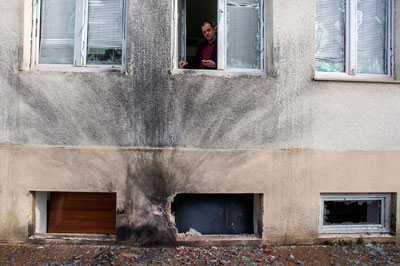Nestled between Croatia’s Dalmatian coast and Albania, the small state of Montenegro (14,000 square kilometers, 630,000 inhabitants) evokes images of sandy beaches, pristine lakes, and gorgeous mountains. The wild beauty advertised by its savvy tourist board, however, looks more like the Wild West for the Montenegrin press. In the past weeks a number of violent attacks against critical journalists have rocked the country.
On December 26, 2013, a bomb exploded outside the office of Mihailo Jovovic, the editor-in-chief of the independent daily Vijesti. On January 3, 2014, Lidija Nikcevic, a journalist working with the other independent daily, Dan, was severely beaten by an individual armed with a baseball bat. On January 12, a device went off outside the home of author and Vijesti contributor Jevrem Brkovic. “It remains unclear who is responsible,” Vijesti‘s director, Zeljko Ivanovic, wrote dryly in the EUobserver. “As usual in cases of attacks against media, the police have been unable to identify the perpetrators.”
To some, these incidents did not come as a surprise. Since its independence from Serbia in 2006, the country has hardly shone in the assessments of international human rights, press freedom, or anticorruption groups. “This is just the latest in a series of violent incidents on journalists and media in Montenegro,” said OSCE media freedom representative Dunja Mijatovic. In 2012, Montenegro was even included in an infamous list of “mafia states,” alongside Myanmar, Venezuela, and Guinea Bissau, in a Foreign Affairs essay by Moises Naim. “In a mafia state,” wrote Naim, “high government officials actually become integral players in, if not the leaders of, criminal enterprises, and the defense and promotion of these enterprises’ businesses become official priorities.”
Despite this dubious reputation, Montenegro is a candidate for membership in the European Union. Formal accession talks were started in 2012. Although the European Commission has played its conventional tune of reform through integration, this process has been fraught with doubts and second thoughts. “Montenegro’s ills seem encysted in the system,” a high-level EU official told CPJ.
To the chagrin of the government in Podgorica, the shockwaves of these recent attacks have jolted the Brussels EU headquarters, where enlargement officials are tasked with monitoring Montenegro’s compliance with the so-called Copenhagen criteria regarding democracy, human rights, the rule of law, and the market economy. “Recent attacks against the media are unacceptable,” said the European commissioner in charge of enlargement, Stefan Fule, on February 5. “Avoiding impunity for the perpetrators is the best tool to prevent such crimes in the future.”
But how can you avoid impunity in a country where, as underlined in a January briefing by the Media Development Investment Fund (MDIF), the rulers have nurtured a culture of impunity? “Most incidents remain unsolved. In no case has motivation been established nor has anyone been held responsible for ordering an attack,” writes MDIF, an independent non-profit organization which has been supporting the Vijesti media group for the past 15 years.
In fact, behind its serene, tourist-friendly facade, Montenegro is a political Jurassic Park. Since the fall of communism 25 years ago, it has been dominated by Prime Minister Milo Djukanovic, a former close ally of Serbia’s ultranationalist leader Slobodan Milosevic. Crime and corruption have prospered and press freedom has taken a beating. “In the past decade,” Ivanovic reminded, “the founder and editor of a daily newspaper has been killed, editors and journalists have been physically attacked, cars belonging to media companies have been set on fire, and defamation cases seeking hundreds of thousands of euros have been brought against critics.”
The government has fostered a climate of hostility against independent media and fanned smear campaigns against its opponents in the press. In this tug of war it has ruthlessly used the resources of the state: public advertising has been refused to critical media and private companies have been persuaded under the threat of tax inspections not to place ads in media deemed hostile to the government. Tons of public money has also been poured into the lackluster national paper Pobjeda, which slavishly parrots the official line.
Press freedom is generally considered a key barometer of the general state of human rights and democracy in a country. It is also an essential requirement for EU membership. Brussels officials have chosen not to shout too loudly this time. However, drawing from their bruising experience with Romania and Bulgaria, they know that rushing candidate countries into the EU without solving key issues linked to the rule of law, corruption, or organized crime is a recipe for disaster.
“Next May’s elections to the European Parliament are likely to bring to the assembly a larger cohort of Euroskeptical deputies that will scrutinize any new entrant,” the senior EU official told CPJ. “The Montenegrin government would be well-advised to heed Brussels’ concerns if it does not want to be sent down the waiting queue.”
In recent years Djukanovic had an easy ride because, as Ivanovic writes, he toed the Brussels line on regional Balkan issues such as Kosovo and cooperation with the International Criminal Tribunal for the former Yugoslavia. In exchange the EU turned a blind eye to the harassment of civil society and independent media in Montenegro. This “cynical trade-off,” as Ivanovic calls it, will not hold much longer if prickly MEPs aware of the European public’s enlargement fatigue decide to strictly monitor Podgorica’s progress in adopting EU norms and standards.
[Reporting from Brussels]
